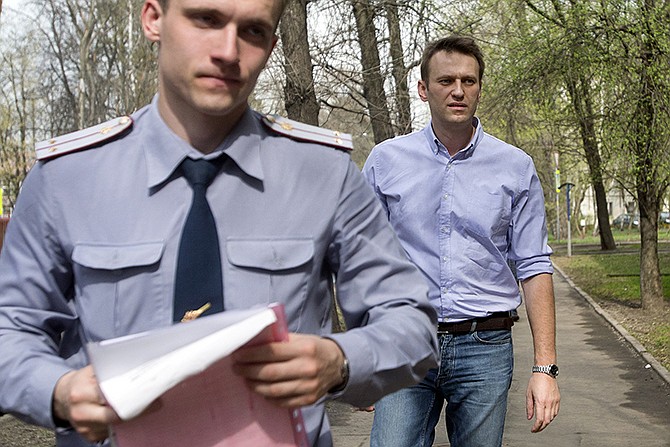MOSCOW (AP) - A Moscow judge on Tuesday left open the possibility of jailing President Vladimir Putin's main critic for years, a sign of Putin's increasingly hard-line rule against opponents.
Russian opposition leader Alexei Navalny was fined $8,400 on Tuesday for slandering a lawmaker. His second trial starts Thursday, and prosecutors who previously secured his house arrest are widely expected to ask for jail for him pending trial, with Tuesday's verdict making him a recidivist. If there's a guilty verdict at that trial, he could get a prison term.
Navalny was nearly jailed last summer, when he was running a high-profile mayoral campaign in Moscow, but the Kremlin figured then he would be more useful if allowed to run. But now Putin, emboldened by an 80 percent approval rating and national euphoria over the annexation of Crimea, appears no longer willing to tolerate any criticism.
Putin increasingly has portrayed his critics as "national traitors." Russians who oppose his aggressive actions in Ukraine have been compared to the Bolsheviks, who used Russia's defeat in World War I to carry out their 1917 revolution that overthrew the czar.
If there was ever a good time for Putin to lock away Navalny, this may be it. The opposition, already sidelined, has been further marginalized because of the patriotic fervor and spike in popular support for Putin over Crimea.
The 37-year-old Navalny, a former corporate gadfly, has been under house arrest for nearly two months, banned from receiving visitors, talking to the media or posting on social networks.
On Tuesday, the Babushkinsky Court upheld the libel claim of obscure municipal official Alexei Lisovenko, who sued Navalny for calling him a drug addict in a tweet in April for claiming that Navalny was violating his parole. Navalny's lawyer insisted the judge never established who posted this tweet, since many of Navalny's supporters have access to that Twitter account.
Navalny spearheaded anti-government protests in Moscow in 2011 and 2012. As soon as the protest movement ran out of steam, Navalny found himself at the center of several criminal probes. In July, he was found guilty and sentenced to five years in prison in one of them. As thousands poured into Moscow's streets to protest what they thought was a miscarriage of justice, prosecutors petitioned to convert the sentence into a suspended one.
Back then, Navalny was running in the Moscow mayoral election against Kremlin-backed incumbent Sergei Sobyanin. Navalny won 27 percent of Moscow's mayoral vote in September, finishing a strong second and cementing his position as Russia's No. 1 opposition leader.
Navalny did not relent in his efforts to expose government graft, publishing several investigations into the illegal fortunes of Russian officials as well as a damning report detailing corruption in the preparations for the 2014 Winter Games in Sochi.
In his latest salvo, Navalny wrote an article for The New York Times in late March, urging the United States to hit Putin's closest allies with sanctions. Less than a day later, five out of nine people he mentioned got targeted.
Navalny, or his wife who is believed to be tweeting on his behalf, saw that as an ominous sign: "One is going to have to pay for this joy from sanctions against those crooks. Time to pack a bag for jail."

